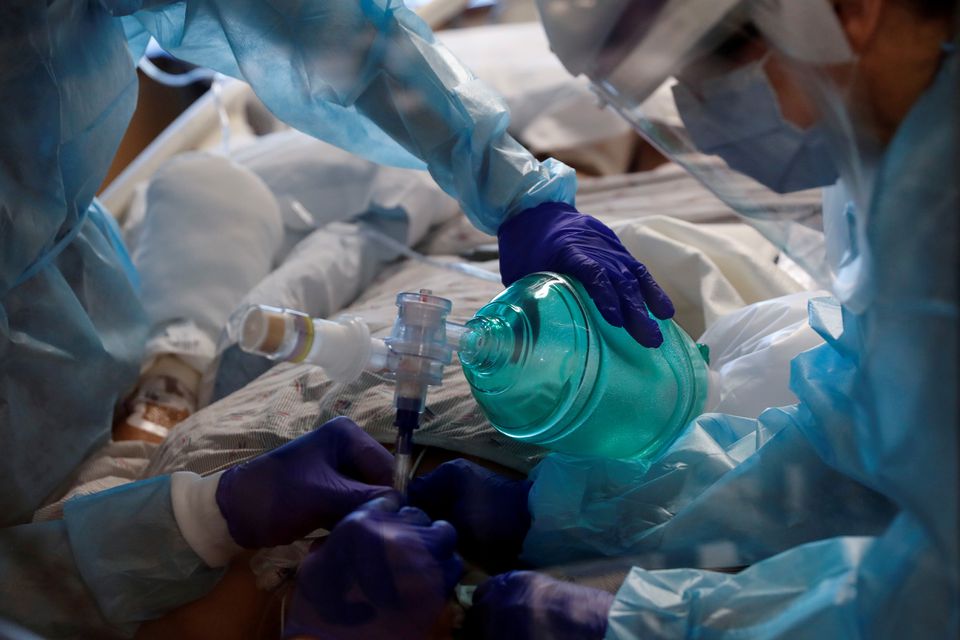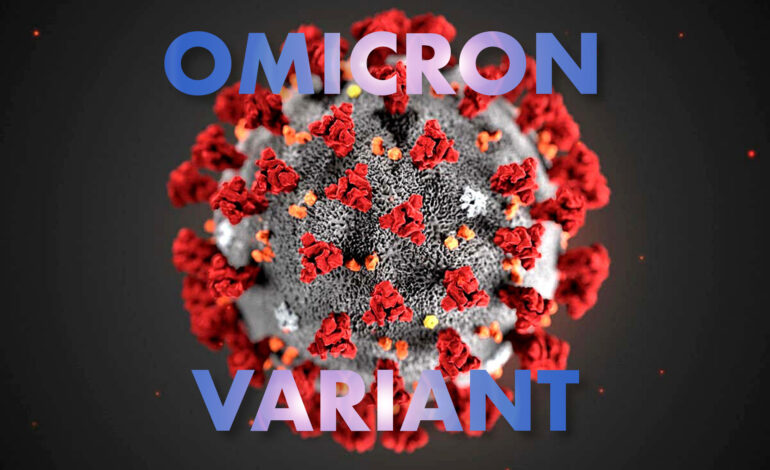– Briana Gasorski contributed to this report
The U.S. Centers for Disease Control and Prevention (CDC) said on Wednesday that the first case of the newly emerging Omicron variant of COVID-19 was detected in the U.S. A second case was announced in Minnesota on Thursday, after which two more states, New York and Colorado, reported cases.
The California and San Francisco Departments of Public Health confirmed that a recent case of COVID-19 among an individual in California was caused by the Omicron variant. The agency said this was the first confirmed case of COVID-19 caused by the Omicron variant detected in the U.S. In Minnesota the second U.S. case was confirmed in a vaccinated resident who had recently traveled to New York City and was found to be infected with the variant.
The Minnesota resident experienced mild symptoms Nov. 22, was tested Nov. 24 and no longer has symptoms. This case was the first known community transmission within the U.S.
New York Mayor Bill de Blasio said city public health officials were aware that the Minnesota case is associated with travel to New York.
“We should assume there is community spread of the variant in our city,” de Blasio said.
The state had found five cases of the Omicron variant by Thursday.
The California individual was a traveler who returned from South Africa on Nov. 22. That person had mild symptoms that were improving, was self-quarantining and had since been testing positive. All close contacts had been contacted and had tested negative, the CDC said. Like California, the Colorado individual had recently returned from trips to southern Africa and had not gotten booster doses.
.@CAPublicHealth, @SF_DPH & @UCSF have detected a case of the Omicron variant.
As we continue to learn more about Omicron, there is no reason to panic but we should remain vigilant.
We know how to protect ourselves from COVID – get vaccinated, get your booster & wear a mask.
— Office of the Governor of California (@CAgovernor) December 1, 2021
On Nov. 26, the World Health Organization (WHO) classified a new variant as a “variant of concern” and named it Omicron and on Nov. 30, the U.S. also classified it as a variant of concern.
Evidence suggests that the variant is more transmissible.
The CDC says that despite the detection of Omicron, Delta remains the predominant strain in the U.S.
Hospitals and public health officials on alert
Health officials say the recent emergence of the Omicron variant further emphasizes the importance of vaccination, boosters and general prevention strategies needed to protect against COVID-19. They recommend everyone 5 and older should get vaccinated and recommend boosters for everyone 18 years and older.
Michigan health officials are now on alert for the newly detected Omicron variant of COVID-19, though a case has not yet been recorded in the state.
Michigan’s health department — the MDHHS — said this week it is monitoring for the variant and advising residents that the presence of variants makes it even more important to get vaccinated, including the booster dose to increase protection, wear masks and take other precautions.
“Ensuring that as many Michiganders as possible are vaccinated remains the best protection we have against COVID-19 – including variants of concern,” said Dr. Natasha Bagdasarian, Michigan’s chief medical executive. “We are asking Michiganders to continue to use critical mitigation measures, such as getting vaccinated and getting boosters when eligible, wearing a mask and getting tested regularly. Increased transmission fuels the development of more variants of concern.”

Critical care workers insert an endotracheal tube into a coronavirus disease (COVID-19) positive patient in the intensive care unit (ICU) at Sarasota Memorial Hospital in Sarasota, Florida, Feb. 11. Photo: Shannon Stapleton/Reuters
We know that there are a lot of mutations (in Omicron) to make it look a bit different. The big question is, worst case scenario, if we have a large influx of patients, more than we’re seeing already, will (the variant) put us in a crisis capacity? — Dr. Dennis Cunningham, Henry Ford Health System
Dr. Dennis Cunningham, an infectious disease expert at Henry Ford Health System, told The Arab American News earlier this week that the hospital system is preparing for the new variant.
But for now, the Delta variant is the predominant cause among COVID-19 patients at Henry Ford, with intensive care units running at 95 to 98 percent occupancy earlier in the week.
“We know that there are a lot of mutations (in Omicron) to make it look a bit different,” Cunningham said. “The big question is, worst case scenario, if we have a large influx of patients, more than we’re seeing already, will (the variant) put us in a crisis capacity?”
Cunningham said the hospital system, a major one in the Metro Detroit area, is constantly evaluating its supplies and staffing to figure out what it needs to do to best care for patients.
“If you look at the Delta variant, that was more contagious and we know that it had nine mutations in the spike protein,” Cunningham said. “The spike protein is how the virus binds to human cells and infects us.”
The Omnicron variant has more than 30 mutations to the spike protein alone. Some of them are the same as scientists saw in Delta, the ones that make it more easily transmitted and more infectious, Cunningham said.
“It also has some mutations that were associated with some resistance to certain monoclonal antibodies, which are lab-made proteins that we can give to high risk patients who have COVID-19 and decreases hospitalizations and death,” he said.
The British drugmaker GlaxoSmithKline has said its COVID-19 antibody drug appears to be effective against the omicron variant based on initial laboratory testing. The company also said it hopes to complete testing by year’s end to confirm whether the drug is effective against all the various mutations seen with the variant.
Cunningham said that a major question for scientists and health professionals is whether this variant is different enough that it will force them to almost start again at square one. He did say that the vaccine will have some efficacy, but experts are unsure whether those people who had a COVID-19 infection previously but are not vaccinated will have much protection against the variant.
“We do know that six months after you’ve had the second dose of Pfizer, those antibody levels drop a little bit, so I suspect you will see public health officials stressing how important the booster dose is,” Cunningham said. “I think the booster dose will continue to protect us against severe disease. There may be some breakthrough disease, but that generally is very mild and people don’t even need to seek medical care.”
Doctors urge Arab community to use caution, curb large gatherings
Dr. Muzammil Ahmed, Beaumont Wayne’s chief of staff, said that this surge and the new variant are much different than the first surges of COVID-19.
“We have significant staff shortages now,” he said. “At least 30 percent of all patients are COVID cases and a high percentage are in the ICU. At least 80 percent of the COVID patients are not vaccinated and 90 percent of our ICU patients are not vaccinated. Now, there’s so many effective options for treatment for COVID. If caught early, it’s more manageable.”
As the National Guard has sent in personnel to help with the staff shortages, Ahmed said that Beaumont Wayne and Beaumont Dearborn are nearing 85 to 90 percent capacity.
“We are not where we need to be for vaccination rates,” he said. “We are trying to encourage people to continue wearing masks, social distance and hand hygiene and, of course, getting vaccinated.”
With the holidays fast approaching and the cases rising rapidly, Ahmed said the community needs to be careful.
“We (Arab Americans) are so family and community oriented and we love being with family and friends, but we need to mask up, get vaccinated and gather responsibly to help protect our elders and our families,” he said. “Our community is used to sacrificing, we’ve done it before and I don’t think this is asking too much. By being careful, we can have small gatherings and enjoy socializing, but it requires that we behave responsibly.”
Dr. Zafar Shamoon, chief of emergency services at Beaumont Dearborn, said that Omicron is anticipated to be handled the same way if it appears in Michigan.
“The new variant is the same preparation,” he said. “But getting vaccinated and getting the booster shots will definitely help the spread and is the number one way to help reduce numbers and keep people safe.”
Our community is used to sacrificing; we’ve done it before and I don’t think this is asking too much. By being careful, we can have small gatherings and enjoy socializing, but it requires that we behave responsibly. — Dr. Muzammil Ahmed, Beaumont Dearborn
Being in the ER, Shamoon said that due to the spike, it’s become difficult to manage, especially with the staff shortage.
“We have an increase in ER visits due to COVID and unfortunately we have had to resort to using tents outside for patients as we did when COVID first hit in March 2020,” he said. “It’s been difficult. It’s a perfect storm really, with shorter staff and more of an influx of patients.”
Despite the influx, Shamoon said he takes pride in his ER.
“Patients may see a long wait time, but all patients are seen by a physician within ten minutes of arrival,” he said. “We are the best ER, in my opinion, in the country. But if people are waiting excessively, there is most likely someone sicker than them that we are treating.”
One thing that Shamoon is grateful for is that vaccine hesitancy has improved greatly over the last year.
“There is really not as much vaccine hesitancy in the Arab community as before,” he said. “Islamically, there are no restrictions and I think the education in the community has helped with that.”
Ahmed said that it’s important for patients to continue to not delay their care.
“If need be, still come to the hospital,” he said. “A lot of clinics offer tele-medicine options that can help determine if a patient should go to the hospital so patients do not need to delay their medical care and risk their health further.”






Leave a Reply